Prologue
Hello! After a long absence I am now going to start blogging again, every week in fact. I’ll be using this blog to document my creative process in writing and composing my practice-led Phd in music which I have just started (Feb 2020). As part of my research, I am composing and recording ‘Canary Wharf: The Rock Opera’ which will be an original long-form musical work with narrative about the financialisation of the economy. I welcome any comments or ideas about my project, please feel free to get in touch!
Setting the Economy to Music: Part 1 – Epiphanies
The ‘ah-ha!’ moment – the epiphany, the life-changing moment of realisation for the protagonist – who they really are, their destiny or both, when the action suddenly pivots and they set off in a completely unexpected direction – is a familiar trope for story-telling in film, TV, novels – but how often does it ever really happen? Has it ever happened to you?
It’s happened to me twice.
Lovers of obsolete sound systems
The first time was when I had moved to the Australian Capital Territory in the early 1990s to take up my first proper job after University as a graduate public (civil) servant, working in the back rooms of the Federal government’s health and community services bureaucracy. You have to make your own fun in Canberra, which is otherwise as interesting as living inside an air-conditioning unit, but in the ‘90s there was a good live music scene there.
One night I turned up at the Australian National University Bar and saw for the first time Sydney and Canberran musicians from the then fledgling electronic arts collective Clan Analogue play live. Extraordinarily beautiful and pulsating sounds from spidery webs of patch cabled analogue synthesisers and live instruments, witty commentary, video projections, a fog machine gone mad. Not many people there, which made the gig feel even more like a secret revealed, a kind of very early ‘80s UK illegal rave off the M25, only in improbably bland middle Australian suburbia. A vibe of musicians having an intellectual, multimedia and political awareness of their practice and a commitment to collective support and action plus a sense of humour. And they sounded like the cool cool new electronica I had been devouring from Berlin/ Detroit/London – which I had thought was only coming from those cities – but this was just as exciting but with a wholly original Australian take.
I wanted in.
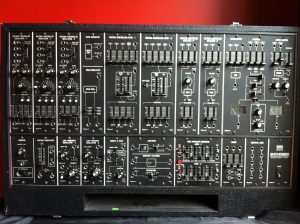
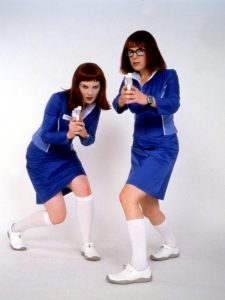
So I got in. I joined Clan and over the next decade spent all my money from my proper job(s) on black boxes, synths, sequencers, computer programs, gadgets, home studio gear, the list goes on. It was just like that ‘80s Tom Hanks and Shelley Long movie The Money Pit, only you replace the insatiable but financially ruinous need to renovate a charming old house with the insatiable but financially ruinous need to collect charming old synths. I set up and spent most of my free time in my electronica Mission Control in various backyard garage studios first in Canberra then in Melbourne when I moved there in 1997. My most successful music projects (B(if)tek – with Kate Crawford – and Artificial -solo) and various other collaborations came out of that decade (1994-2004) and fans and followers still like and buy my musical output from that period even now.
The London day job
Fast forward past half a dozen albums, bands, various film and TV commissions to 2019 and I am living in Stoke Newington, a former pretty medieval rural hamlet in North East London that Henry the 8th used to visit in order shag Anne Boleyn and other mistresses (I used to walk down Boleyn Rd on my way to Dalston Junction station each day). Stoke Newington was swallowed up by Hackney borough at some point and now leans uneasily against hipster bars /smells of Jamaican food/ Turkish drug money shop fronts crammed along Dalston Kingsland High St which is always ‘kicking off’ and creates interesting late night pedestrian navigation challenges. My proper job now is doing communications support for an extraordinary team of surgeons, scientists, doctors, paramedics and allied health professionals at the Royal London Hospital, Whitechapel East London. These people are working for the Centre for Trauma Sciences, undertaking world leading discovery biomedical research and translational clinical trials to try and find better life saving treatments for victims of traumatic injury around the globe.
Day jobs for artists just don’t get better than that – in terms of meaningful work and being able to hang out with the best of humanity every day. But I was also acutely aware that, after 5 years of woking there, my annual admin salary was about on par with many of the hugely qualified neuro-trauma research scientists in the lab, and higher in fact than many of the allied health professionals working in the hospital and on ambulances. As a single renter in London, I needed my modest wage to survive – I was not saving any money – but how was it OK that people who mattered so much to society – front-line medics, bio-medical scientists researching cures for things that can kill all of us – had such poor working conditions and were paid so badly?
Did it have something to do with how ‘the economy’ was managed? But London and New York are the world’s richest financial centres, according to the Global Financial Cities Index. Or was that the problem?
East 17
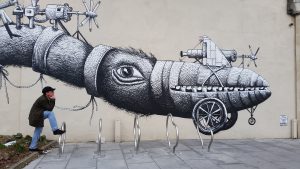
In March 2019, I got an email from Dan Edelstyn asking me to attend the filming of the Big Bang No 2 – the explosion of the pay-debt of many of Walthamstow’s poorest residents. I’m still not sure how I got on this email list. (My sketchy memory will be a constant problem as I wade my way to the end of my Phd project and try and recall from what misty shores I actually set off.)
Dan Edelstyn (filmmaker) and Hilary Powell (printmaker) are two artists based in Walthamstow, a suburb I once called home for four months in 2018, when I lived briefly in a cramped Victorian flat around the corner from Seven Sisters tube station. My little flat share boasted a slime covered rotting decking out the back that I put my foot through on more than one occasion, and a 2 bedroom flat upstairs, crammed with 3 generations of a Lithuanian family who were cheerful but whose every trip to the toilet and lit fag was registered through the wafer thin floorboards above my bed.
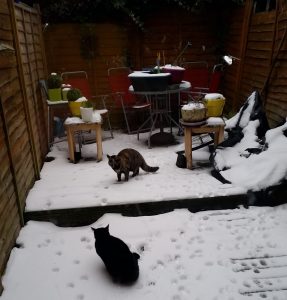
But out of the impoverished, multiethnic borough of E17 (yes, same borough for ‘90s boy band East 17), there was now apparently a new groovy institution in the hood – an artist led rebel bank. In 2018, Dan and Hilary had leased a disused bank space -formerly the Cooperative Bank in Walthamstow High St – and were using it as an artist/ activist space to allow other artists to congregate and work, and to have regular talks and social gatherings with leading progressive economists from the UK and elsewhere.
Dan and Hilary’s self-proclaimed Hoe Street Community Bank (a sly pun on HSBC, one of Britain’s oldest and most scandal-ridden banks) printed their own bonds and money as artworks, sold them to individuals (like me) and institutional collectors (like the V&A) then used the proceeds to cancel locally incurred predatory pay-day debt. HSCB managed to raise over £40,000 through the sale of their bonds and banknotes which feature elegantly designed images of local ‘heroes’ such as a foodbank manager, disadvantaged youth support worker etc. They then donated £20,000 to local Walthamstow charities and the remainder was used to purchase £1.2 million worth of local payday debt through the secondary debt market. Far from then behaving like secondary market debt collectors – ie threatening and bullying people to pay back the full cost of loans that the secondary market operators had purchased for a tiny fraction of their book value – their loans were written off, giving over 400 low income people respite from their ever deepening debt traps, originally largely incurred to meet basic living costs[1]
When I got the above email, I read more about what Dan and Hilary had done, and why they had done it, and why they were making a film about their politically motivated artist adventures into the world of high finance. They explain their motivations thus:
“This mischievous feature documentary led by artist/filmmaker team Dan Edelstyn and Hilary Powell, instigates and follows a community coming together to make their own currency, opening a bank in order to examine how money and debt is created in our economy and to ask important questions about how the system of money creation might be altered in their favour.
Debt is an integral component of our current system of inequality. 97% of all money is conjured into reality at the moment when banks make loans. This means our money supply is effectively on lease from private banks – giving them inordinate power determine the course of our economic, social and common good. Yet we, the public, do not yet fully understand the way money comes into existence – and while we remain in the dark, there will be no way to change course.
Our act of citizen money creation is both a way of raising real money for specific causes in the community and a way of fundraising to buy and destroy £1million of local predatory debts.
Through the film we argue that widespread debt is the natural – though unwelcome companion to the money system we currently have and, like money, another widely misunderstood phenomena subject to myth and moralising.
From both talking to economists and our local community we discover that debt is tied to even the most basic provisions, education, healthcare, housing – as all these are being accessed through credit in one way or another. We argue that these debts are a result of a monetary system which is impoverishing multitudes by design, and which could be changed.”
The second epiphany
Early on a shivery spring morning 20 May 2019, I detoured right out of Boleyn Rd and joined Kingsland Rd and hunched quickly past the stirring Dalston market stall holders and the homeless people that curled around the market’s edges that were all familiar faces to me and to whom I often gave money after I’d bought a basket of disturbingly cheap avocados. I then jumped on the Overground from Dalston Junction to Shadwell, then changed to the DLR which I took to Pontoon Dock. Once in London’s ancient docklands territory, I trudged down the now bleak non-place that is the interstices of roads and industrial blocks that lead you to West Silvertown. No-one walks here now, so when I started to walk along the empty footpaths towards the designated meeting place underneath the Connaught Bridge overpass, I knew the handful of pedestrians shuffling ahead of me in the milky grey light were almost certainly making their way to the filming viewing spot too.
Within an hour, a crowd of maybe 100 or so people were hooting and cheering as we watched Dan and Hilary blow up a van in the shadow of adjacent Canary Wharf, London’s post-Thatcher privately owned financial district. The gold painted van symbolised the debt that HSCB had purchased, and the explosion and fluttering down of IOU ‘debtors notes’ and van debris symbolised all the Walthamstow people now potentially freed from their otherwise indefinite sentences to pay-day debt driven poverty and depression. And all of this happening thanks to Dan and Hilary’s artist-based intervention into the finance world of buying and selling debt instruments.
That was my second epiphany. I wanted in.
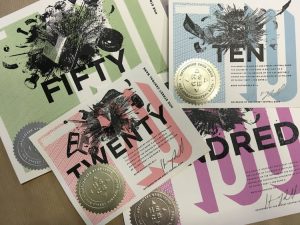
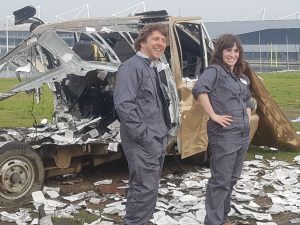
So I started dropping in on Dan and Hilary and turning up to as many of their their locally organised events at the Bank of Ideas as I could – talks that featured progressive economists and financial commentators, activists and artists united by a desire to demythologise the financial and economic institutions and rhetoric that controlled almost all our life choices – but which most of us scarcely understand.
By the end of 2019, I knew what Dan and Hilary were doing and documenting in the UK was tremendously exciting, galvanising, timely and surely the start of a new artistic/ political movement. (NB: This is now happening people – join us here!) But how to contribute to this as a musician?
Then I started thinking about media reports about some dark events that had happened in Canary Wharf in January 2019, and it struck me that it might just be time to dust off the rock opera as a music format and tell an epic tale about 21st century finance man…
Next week: Setting the economy to music part 2: ‘This is Canary Wharf’.
[1] In Britain, there are no controls on interest rates which are left to the discretion of lenders who set these according to their assessment of borrower risk: the annual percentage interest charges on small payday loans, often taken out to meet rent or food bills, can be up to 1500%.
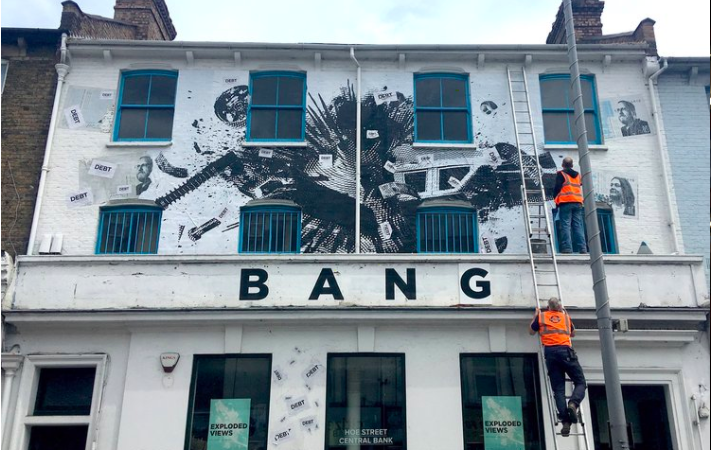
6 comments
Love the stuff about HSCB – what a great thing to do. Looking forward to the next installment!
Hey A, thanks so much! Yes Dan and Hilary at HSCB are my heroes! Chat soon! x
Fabulous idea and terrific blog. Don’t feel you need to write this much every week whilst doing your PhD. Regularity is probably more interesting to the reader – the feeling of participating in some small way with your journey – than too much to digest. The thought provoking ideas are fascinating. Many thanks.
Hi Michael, thanks so much for your kind encouragement! You’re right, will be a bit of stretch to write so much each week, but definitely will be posting as regularly as I can! Take good care, thanks again and best of luck with your music projects too
Hi Nic. Fascinating as always, must catch up. Love Andrea and Tony
Thanks Andy! yes, talk soon! xx